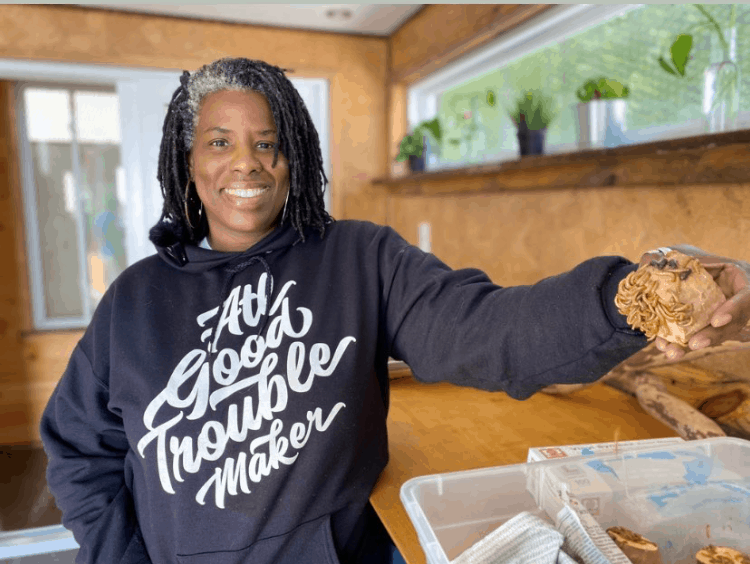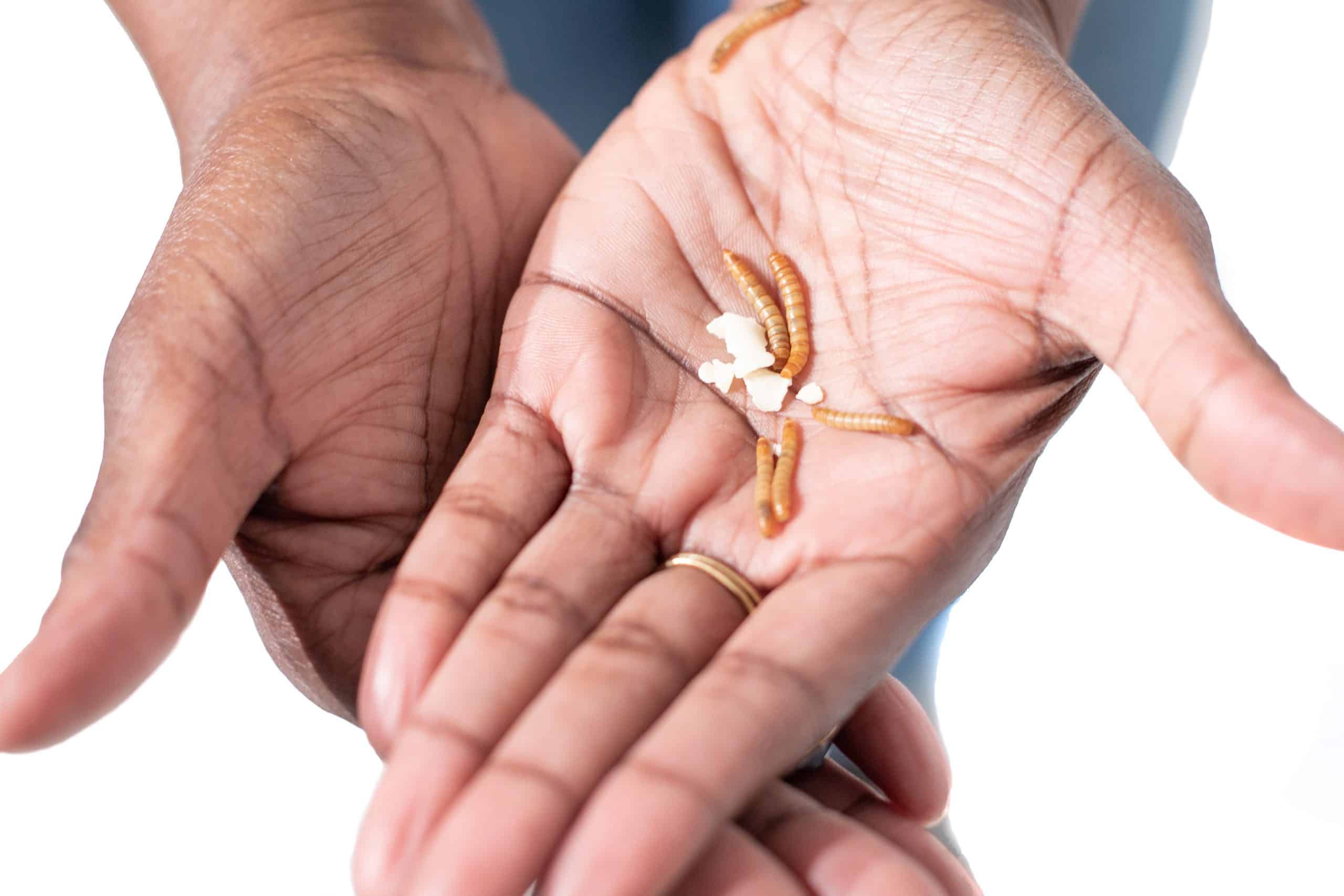
Level Up Your Business Today
Join the thousands of people like you already growing their businesses and knowledge with our team of experts. We deliver timely updates, interesting insights, and exclusive promos to your inbox.
Join For FreeBy transforming cheap, sustainable grubs into surprisingly tasty food, Akissi Stokes and Karim Nelson have developed a business model that makes healthy protein more available to everyone.

It’s easy to find bad news in the world, even if you don’t go looking for it: hunger, refugees, and catastrophic climate events are just a few. Taken individually or all together, it’s enough to cause feelings of helplessness. So finding an organization that does something to address all these crises and more — while operating at a profit — is a welcome treat.
It’s even better when that treat is a warm chocolate chip cookie.
The company is WUNDERgrubs, and its business model is as unusual as its products. CEO and co-founder Akissi Stokes, along with her partner, co-founder, and COO Karim Nelson, directs the growth and consumption of about 50,000-60,000 mealworms each month. Among their products, shoppers can find premade cookies and mixes, pancake mix, and plain protein powder ready to add to their own recipes.
The mixes are both an effective introduction to the idea of eating insect proteins and a sweet distraction from WUNDERgrubs’s core mission of ensuring adequate nutrition and food equity as a way of ending hunger worldwide.
The partners credit many influences and factors for their business idea. For one thing, Stokes grew up on a farm in Southwest Georgia, and she had what she calls “an earth-friendly mother” who instilled an appreciation for sustainability, food co-ops, and tofu, among other things. Nelson, on the other hand, grew up on the island of St. Thomas in the US Virgin Islands and Brooklyn in New York. On the island, he experienced first-hand the devastation of weather events, including Hurricane Hugo and seven other major storms that strained natural resources and interrupted food supplies.
Together, Stokes and Nelson watched an episode of Anthony Bourdain’s TV show “No Reservations” that showed the celebrity filmmaker and chef visiting Haiti after an earthquake.
“He was visiting a chef in the quarter, and he saw people on the fringes, really hungry and in despair. And he bought out the soup kitchen (to feed the people gathered around). Chaos ensued,” Stokes recalled. “People were getting in line to eat, and it got really ugly.”
Bourdain described the incident in simple terms: “Hungry people anywhere behave like hungry people,” he said in the episode. “We didn’t think it through. We thought short-term, feel-good, obvious-seeming solutions. But there are no easy answers.”
Watching the episode, Stokes and Nelson drew on their personal experiences growing food and surviving climate events. And that’s when they first discussed the idea of a business promoting insects as food, fertilizer for the soil, and the opposite of a short-term solution.
“Insects as food and fertilizer. I was sold,” Stokes said. “I love this.”
Insects as food and fertilizer. I was sold.
Practically speaking, starting an insect farm wasn’t as easy as it might have seemed at first glance.
“A couple companies were doing cricket protein, protein bars in particular,” Stokes said. “Karim said, ‘No way; they’re going to jump out out the box, and they stink.’ There were just too many negatives. We tried silkworms, but we have too much heat here.”
Then the partners located a mealworm supplier, based in California, that was already supplying food-grade insects to the TV show “Fear Factor.” They ordered 10,000 grubs to rear in a closet in their home.
“By accident, we found out that they ate through the newspaper they came in,” Stokes said. “They can eat Styrofoam. These guys are pretty resilient. They didn’t have to be a protein option located next to catastrophic events. They could be a viable protein source.”
Of all the options they considered, mealworms came out ahead by every measure: They’re affordable, accessible, and nutritious.

“When we talk about equity in the food supply chain, we want everyone on the sliding scale to be able to afford protein, whether you’re a millionaire or working class,” Stokes said. “That represents equity.”
When we talk about equity in the food supply chain, we want everyone on the sliding scale to be able to afford protein, whether you’re a millionaire or working class.
The duo established WUNDERgrubs in 2016, quietly building some success. After an appearance at Essence Music Festival in 2017, things started moving faster. Then COVID put the brakes on.
“For all the ills that came with it, it gave us some clarity,” Stokes said. “It also validated some things that we were seeing. Our supply chain was whacked. We were able to ride out the 2020 storm.”
At the same time, the pandemic spotlighted the issue of food insecurity right here at home, particularly in areas known as “food deserts,” where options for food shopping are either few or far away. More important, not every shopper has personal transportation, meaning they have to rely on public options like crowded busses.
“You’re now risking your life in some cases to go get something that’s considered a necessity,” Stokes said. “We would drive to some areas to see what fresh and healthy options are there. Sometimes you had to drive 10-15 miles to get to a food outlet.”
Focused as they were on growing a farm product that required no land, no water, no sun, and no chemicals to grow, in 2020 WUNDERgrubs’s owners realized the potential in growing partnerships, too. In 2020, that meant showing people how to set up their own farms and make money from it — or use the grubs themselves. Growing the mealworms through small partnerships does more than just strengthen the supply chain. It also reduces transportation emissions and offers small farmers an income.
“You can grow the equivalent of a cow in a closet,” Stokes said. “We don’t ever want a 70,000 square foot warehouse. We want 10 small farmers that we share profits with. We’re talking about decentralizing distribution channels, lessening emissions, making it a more tenable and sustainable supply chain.”
We’re talking about decentralizing distribution channels, lessening emissions, making it a more tenable and sustainable supply chain.
Practically speaking, that means WUNDERgrub’s business model is as diverse, and as unique, as its product.
“We have a hatchery here, where we farm mealworms, then we help people set up small commercial facilities. Then we help with marketing. There are no upfront expenses,” Stokes said. “Each person can use the grubs for different practices. Someone may use them as a composting agent, to compost nonfood items. Farmers set their own goals. How many pounds do you want to produce? Some partners get prepackaged dry goods. We have one or two who are co-bakers with us and are making signature products for us.
“Our models are built around a circular economy and profit-sharing,” she said. “Customers turn into partners. We’re not looking to repeat linear agriculture. We want to be circular in nature and integrated within our value chain and our supply chain. When we’re making the protein powder, the grub byproduct is used as fertilizer, or they’re eating food waste.”
We’re not looking to repeat linear agriculture. We want to be circular in nature and integrated within our value chain and our supply chain.
Of course, the whole business rests on customers’ willingness to sample insect protein. So what about what might politely be called “the ick factor” of eating insects? Stokes and the WUNDERgrubs team acknowledge it, but they don’t let it hold them back.
“Eighty percent of countries worldwide have insects as part of their diet in some fashion. Having an international group of friends, it’s not a big deal to go downtown and eat crickets or ants at a street fair,” she said. “I do see it growing here. We are not trying to do shock value. We realize the way you present it other countries is not the way you do it here. That’s why we started with the cookie. We are stuck with the cookie!”
We are not trying to do shock value…That’s why we started with the cookie.

Stokes said that for many Americans the barriers to eating any food are the way it looks and the way it smells.
“In the western market, WUNDERgrubs will never put a mealworm on top of a salad,” she said. “We found the powder to be the most palatable for people. If it’s mixed with cheese or ranch or buried in something, they’re okay. We’ve had tastings where people say they’re not going to eat anything. We definitely have converted people once they taste it.”
And she is hopeful that in the US, like in the majority of countries, consumer hesitation will diminish over time.
“When Karim and I talk about the history of food, I always bring up lobsters. They used to be food for prisoners,” Stokes said. “Sushi — when I was young, 20-30 years ago, people would think you were crazy! Now it’s in the grocery store. There’s an opportunity for the next generation.”
That’s not to say that she’s waiting for a full generation to pass while her products gradually find a home in consumers’ pantries. Already, she says, kids are among her best customers and the most willing to sample.
“We’ve done a lot of focus groups and customer surveys. Moms love us. It’s sanitized, it’s traceable, low in sugar but still healthy and it tastes good. That’s what a lot of parents are looking for.”
Moms love us. It’s sanitized, it’s traceable, low in sugar but still healthy and it tastes good.
Stokes isn’t writing off seniors, either. In fact, WUNDERgrubs would love to partner with Meals on Wheels to deliver high-protein food to housebound seniors.
“Seniors are more like the younger audience,” she said. “They’re actually pretty open. For them, as long as it looks and smells okay, they’re good. One of our first pilot farms was with a five-generation legacy farm run by a Black woman in Mississippi. She turn us on to the cohorts she works with and some of them were very open to rearing insects. It’s less taxing for them physically, and there’s less overhead.”
But what about the taste?
“If we didn’t tell you, you wouldn’t know,” Stokes said. “The taste is not offensive. We’ve had people put them in raw, thinking something was going to happen; nothing happened. It’s the psychology of it. The cookies are here to stay.”

COO Karim Nelson.
WUNDERgrubs’s farms may be small, and their livestock even smaller. That doesn’t mean the company doesn’t have big plans. The company has a stated goal of feeding more than one million people in the Southeast region of the US by 2030, using affordable and delicious protein from sustainably farmed edible insects. A secondary but no less important goal is conserving natural resources and regenerating the region’s soil.
As the company looks ahead toward moving out of the COVID pandemic, WUNDERgrubs is ready to grow, without outgrowing its carefully cultivated community.
“We realized keeping the remote rural markets B2C is where we want to stay. Not that we don’t want to serve elite athletes,” Stokes said. “Fifty million people in the US alone are experiencing food insecurity. Eighty-seven percent of the southeast is considered to be in a food desert. That’s a dismal number.”
Fifty million people in the US alone are experiencing food insecurity. Eighty-seven percent of the southeast is considered to be in a food desert. That’s a dismal number.
That’s a big problem, with many causes, that’s going to require creative and adaptive solutions. Stokes envisions everything from summer camps for kids to a kit that transient people can carry with them, growing their own protein even if they’re in an area without usable land.
“Grubs don’t care!” Stokes said. “Insects are so freaking versatile. The mealworm, you can infuse the taste based on what you feed it. I call it the tofu of insects. If you feed it all apples, it’s different than all carrots. Some insects do have zestier tastes than others. I’ve tried cockroach. You can’t make it taste good.”
WUNDERgrubs also is expanding overseas, thanks to a connection with a farming organization based in the Republic of Cameroon.
“There are a number of Cameroonian refugees who have been relocated. We met them through Georgia Tech,” Stokes said. “We are right now shipping grub kits to pilot out with a couple famers there, helping them understand the conditions, using some technology they have available for personal consumption or to take to market.”
Near or far, Stokes welcomes what some might see as competitions in the edible insect market.
“We’re thinking the more competition the better,” she said. “It helps the industry to grow. I’m pushing Georgia to become a flagship grant state for insects. We are ready to grow and looking for investment. We know what we need to know, and we are ready to grow our team and scale up operations to get products out to more people.”
I’m pushing Georgia to become a flagship grant state for insects.
Already, a student has joined the team for a year-long internship. That allowed WUNDERgrubs to put their plans for summer camps into action this summer. The intern organized AR and VR immersive experiences, educating kids and hoping they’ll take their new knowledge — and expanding tastes — home to their families.
“We are a for-profit company, but we also are a social enterprise company,” Stokes said. “We are making money, we’re just not trying to return 40% on the dollar. Our ROI isn’t just profit, it’s also impact. We have to start thinking differently. If people are healthy, the planet is healthy. We’re in this together.”
Get in touch with a real human being on the Merchant Maverick team! Send us your questions, comments, reviews, or other feedback. We read every message and will respond if you'd like us to.
Reach OutGet in touch with a real human being on the Merchant Maverick team! Send us your questions, comments, reviews, or other feedback. We read every message and will respond if you'd like us to.
Reach Out
Let us know how well the content on this page solved your problem today. All feedback, positive or negative, helps us to improve the way we help small businesses.
Give Feedback
Want to help shape the future of the Merchant Maverick website? Join our testing and survey community!
By providing feedback on how we can improve, you can earn gift cards and get early access to new features.
Help us to improve by providing some feedback on your experience today.
The vendors that appear on this list were chosen by subject matter experts on the basis of product quality, wide usage and availability, and positive reputation.
Merchant Maverick’s ratings are editorial in nature, and are not aggregated from user reviews. Each staff reviewer at Merchant Maverick is a subject matter expert with experience researching, testing, and evaluating small business software and services. The rating of this company or service is based on the author’s expert opinion and analysis of the product, and assessed and seconded by another subject matter expert on staff before publication. Merchant Maverick’s ratings are not influenced by affiliate partnerships.
Our unbiased reviews and content are supported in part by affiliate partnerships, and we adhere to strict guidelines to preserve editorial integrity. The editorial content on this page is not provided by any of the companies mentioned and has not been reviewed, approved or otherwise endorsed by any of these entities. Opinions expressed here are author’s alone.